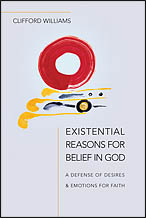 Once you’ve encountered solid evidence for belief in God, it’s hard to settle for anything less. That is, if you think you have reasons for affirming that the Christian God is real, and that believing in him means having actual knowledge about reality, it’s hard to listen to people who say things like “I believe in God because my heart bids me believe,” or “my reasons for belief run deeper than reason can fathom,” or “faith is not from an evidential creed but from an existential need.” I made that last one up, but you can use it if you want.
Once you’ve encountered solid evidence for belief in God, it’s hard to settle for anything less. That is, if you think you have reasons for affirming that the Christian God is real, and that believing in him means having actual knowledge about reality, it’s hard to listen to people who say things like “I believe in God because my heart bids me believe,” or “my reasons for belief run deeper than reason can fathom,” or “faith is not from an evidential creed but from an existential need.” I made that last one up, but you can use it if you want.
The point is, a subjectivized epistemology is not the right equipment for navigating a world where people make real truth claims like “there is no God.” So when I got a review copy of Clifford Williams’ new IVP Academic book, Existential Reasons for Belief in God: A Defense of Desires and Emotions For Faith, with its clean white cover sporting a few splashes of color and a crisp sans-serif typeface, my first instinct was to think I’d been sent a pretty package of mushy softness. Entry number five thousand in the long Christian “retreat to commitment” under heavy fire from modernism? Another dose of pastoral existentialism to keep the faith safe from attack by regnant rationalism?
But the title itself sounded very carefully chosen: It promised reasons (plural!), and a defense. It suggested that desires and emotions were not the whole story, but were to be situated within a larger context. The author’s bio on the back cover says that Clifford Williams has written books on Kierkegaard. That could be good or bad, frankly, and it hardly allays my visceral reaction against subjectivism. But the endorsements were promising, so I dug into the book.
And it turns out that Existential Reasons for Belief in God has a great argument. Not only did it manage to get past my anti-subjectivist screening, but it convinced me that the mesh of my screen has been a bit too tight. I still like solid arguments and truth claims, but my mistake has been in thinking that that sort of disinterested rationality is supposed to exclude existential need, as if the two are mutually exclusive. Williams shrugs off that dichotomy quite easily, and gets on to some serious philosophizing.
Williams distinguishes between purely logical rationality on the one hand, and need rationality on the other. Need rationality: an interesting term, which Williams defines as the reasonableness of satisfying real needs.
We can call the reasonableness in these cases need reasonableness or need rationality. In need rationality, those who satisfy their needs by believing certain things are being sensible and wise. They are taking care of themselves. Need rationality consists of successfully satisfying needs. (p. 58)
You don’t have to think of need rationality as being able to stand independently, as if purely logical rationality could, or should, be excluded from its environs. The breakthrough moment for me was recognizing that need rationality does not invalidate purely logical rationality. In other words, if I believe in God because there are good reasons to do so, and I also believe in God because I need to believe in God, my overall grounds for believing in God are not weakened but strengthened. Williams undertakes to give us a license to recognize that when our belief has a foundation in our need to believe, we are on solid ground: more solid than if our belief were merely the right proportion of assent directed toward the right amount of evidence.
I haven’t said it as well as Williams does in the book. But I do recommend Existential Reasons for Belief in God, which lays out the simple argument very nicely. Williams is a very clear writer, and he uses an easygoing style in this book that is a far cry from the clipped precisionism of much contemporary philosophy. He is nearly capable of rambling at times! And he incorporates numerous vignettes, first-person testimonies from unidentified people describing their beliefs in a range of ways that illuminate and fill out Williams’ argument. This is good philosophy of religion, and as far as I can remember Williams politely but completely ignores the so-called “new atheists” in favor of much better informed interlocutors: Pascal, Kierkegaard, Unamuno, William James, Ernest Becker, and a host of others. These names don’t signal an influx of subjectivist existentialism here. They signal a rational approach to faith that won’t let itself be driven out into the arid territory of the merely, heartlessly, rational. Williams says we need more, and that neediness is both legitimate and dependable.